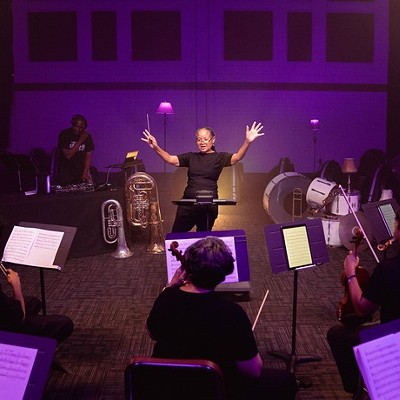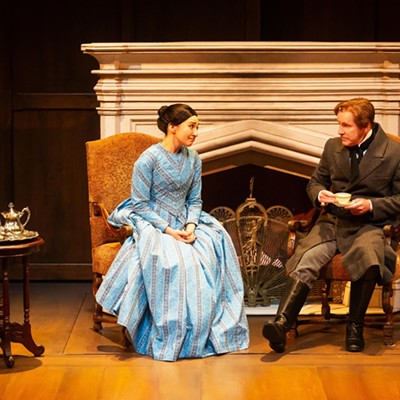The set-up: If you were an upper middle class character in some classic Russian play at the end of the 19th century, let's say Chekhov's The Seagull, your sad but comic melancholy would be worn on your sleeve. It would be an elaborately embroidered sleeve, to be sure, from the finest cotton and starched by hand, but the emotions would be guarded and a bit circumspect. If you're a an upper middle class character in a sly update of said theater classic, let's say Aaron Posner's stupid f*****g bird, you'd wear your melancholic frustrations emblazoned across your t-shirt for all to see. Feelings to live by, revel in, out there, twittered through the universe.
The execution: Thoroughly mesmerizing, never less than entertaining and provocative (how about that title, huh?), Posner's epic knockoff (2013) is much more a love letter to the theater than it is to Chekhov. Yes, bird riffs on the 1895 Russian comedy as starting point, invoking most of the famous characters, plot and situations that are by now almost patented devices, but Posner filters the whole thing through post-modern gimlet eyes until the play becomes a meditation on theater itself. Is your life changed, it wants to ask, by going out to the theater, this theater, Stages, and watching a play, this play, which has been written by one of the characters? And by the way, are you not a character in your own play right now? Haven't you ever felt like you were watching yourself act through life?
This kind of thinking isn't new (remember "All the world's a stage"?), but Posner keeps the avant-garde hip-hop fresh, dipping into Chekhov as if drinking at the source, using what he needs in this whirligig disquisition on life, art, family, and love.
He breaks the fourth wall all the time, having the actors, or their characters, sometimes both, turn to the audience to ask for advice or to debate the merits of what's happening, or just to vent. At first this technique surprises. Later, a few brave souls in the audience respond to the direct questions, and the actors take the advice in stride. Constantly reminding us we're watching a play is a time-worn technique, but this author's conceit bogs down the play unnecessarily, tripping up the drama's momentum just when we're getting into it.
Fortunately, bird offers many charms that offset the interruptions. Foremost is a superlative cast. By play's end, these irritations turn somewhat endearing, just like the fascinating characters on view who behave badly, stupidly, blindly in their quest for happiness. For all their foibles, and they have plenty, believe me, they are wondrously human, never fulfilled, always questioning. That Chekhovian specialty is caught by Posner with admirable facility and dexterous stagecraft. "Don't judge," warns an imperious Emma, waving a well manicured finger at us, unless you're "socially responsible, deeply fulfilled, vegan, charitable millionaires, who work out and have sex three times a week." There's a wicked snap to Chekhov.
You don't have to know anything about The Seagull to be caught up in bird's spell. You'll know these people soon enough. The place is "here," the time "now." At the lakeside house of famous actress Emma (Elizabeth Ann Townsend), son Con (Ross Bautsch) stages a play, a site-specific happening, that's something new and modern, he hopes. He pines for lovely Nina (Emily Neves), his amateur actress, but she's distracted by Emma's lover, famous writer Trig (Shawn Hamilton), who does nothing to stop the infatuation. Rebel Mash (Elaine Robinson), all in black because "it's slimming" and because "I am in mourning for my life" (a direct lift from Seagull), loves Con. Mash, in turn, is loved by sweet innocent Dev (Joseph Palmore), Con's best friend and confidant. Omniscient and overseeing this round robin's nest of would-be lovers is Emma's brother Dr. Sorn (James Belcher). When he's not being ignored, he pines for something less tangible: more time.
The seeds of Chekhov are planted, and Posner reaps a grand harvest. An adroit choreographer, director Kenn McLaughlin allows the forces of family dynamics and lovelorn weariness to collide and interact with abundant theatrical flair. Each character is highly individualized, yet no one could exist without the others. It's a show about equals - equally clueless, lost, hoping - and no one keeps the spotlight for long. As surrogate playwright, Con is prime, and though he's cursed by melodramatic overkill, Bautsch goes for broke. He whines loudest and longest of the group, so we don't truly warm to his character, but Bautsch surprises us with rich variations on a young man's angst and hurting heart.
As gorgon mother who sees passion and fame slipping away, Townsend is radiant, with voice pitched somewhere between Tallulah Bankhead and Mount Vesuvius,. She's also gutsy, for she must perform a nude scene directly after dewy Miss Neves reveals herself. Discreetly handled in the low morning light of a dark kitchen, Nina has removed her top for Trig's perusal, but is interrupted when Emma storms in, chasing Nina from the room. In desperation and employing all her own theatrical wiles, but also wise and knowing, Emma pleads with Trig to come back to her, the one person in his life who knows him best. It's one of play's most glorious scenes, heartbreaking and painfully truthful, and Townsend plays it with sublime restraint, glowing from within.
Robinson, as depressed goth Mash who has an appropriate ukulele song for every various shade of her dark moodiness, is prickly and forlorn. Patmore practically steals the show with his loopy Dev, full of hope and understanding much more than anyone gives him credit. Neves, as wily Nina using youth as lure, desires fame with the same ferocious tenacity as older rival Emma. Hamilton conveys Trig's ego with rueful old-world charm and grace; and Belcher wraps the wistful doctor under layers of cozy compassion and regret. It's an exemplary cast. As in Chekhov, we like them all.
Jon Young's scenic design is simple but elegant - planked wood floor, folding chairs, a gigantic desiccated bird wing suspended upstage (OK, we get it!), and a second act kitchen set that would be the envy of HGTV. Renee Brode's painterly lighting and Phillip Owen's plaintive soundscape, are, as is usual with Stages, hallmarks of the company's meticulous production design. The play shines.
The verdict: Don't let that profane title put you off. It's only there to shock. (And there's plenty more salt sprinkled throughout the play, so be warned.) Overripe and occasionally maddening, stupid f*****g bird ultimately soars. With an aerodynamic cast, the play glides over Chekhov on unique updrafts, a rare bird all its own. stupid f*****g bird continues through April 12 at Stages Repertory Theatre, 3201 Allen Parkway. For information visit stagestheatre.com or call 713-527-0123. $29-$49.






